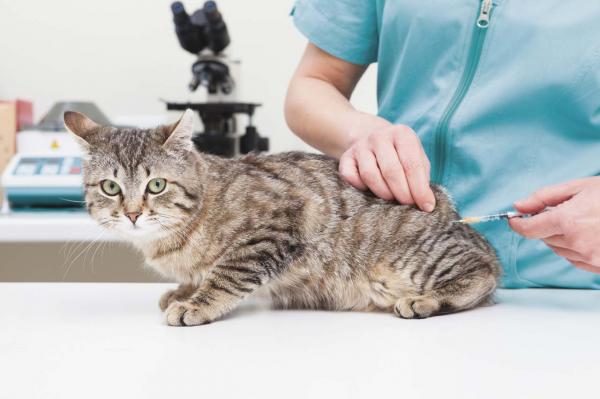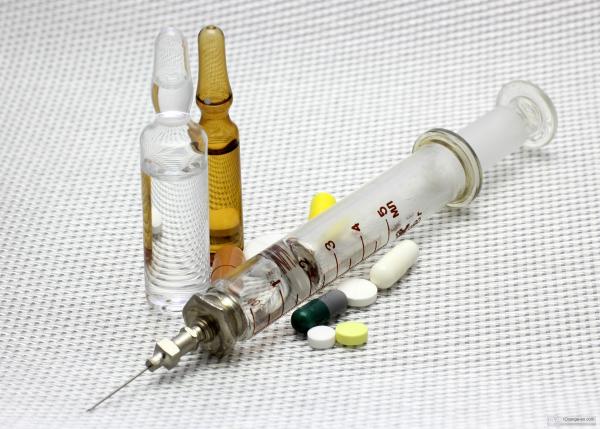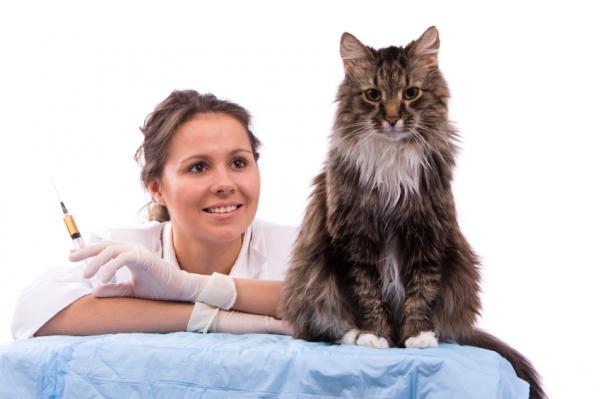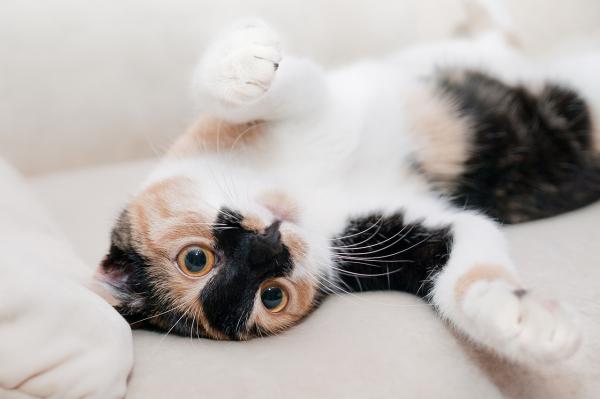Vaccine schedule for cats

If you are a cat owner or you are going to adopt one, as the responsible owner, you will have to inform yourself about many things. One of the most important is the prevention of many serious diseases for them. This prevention will be achieved with adequate vaccination.
What is really important is that depending on the place where we live, vaccines or others will be compulsory and the periodicity will also vary. Keep reading this new article to inform yourself about the Vaccine calendar for cats. This will ensure that the health of your feline is stronger.
What is a vaccine and what is it for?
Vaccines are substances created to help the body fight certain diseases. These substances are usually administered subcutaneously and contain the antigens needed to create the antibodies in our cat’s body. Depending on the disease we intend to fight, the vaccines contain fractions of viruses, attenuated microorganisms, etc. It is with this slight contact of the disease, when the immune system of our cat will create the necessary defenses to fight against that disease in case of presenting itself.
The vaccinations that must be done to our cats can change in mandatory and periodicity depending on the geographical area in which we live, as it may be for example that in that area there are specific endemic diseases and that others are eradicated. Therefore, it is our obligation as citizens of that area and as responsible owners of our pet, inform us of which vaccines are obligatory and each time when we must put them to our cat. It is as simple as going to our veterinarian and asking him to inform us about the vaccination schedule that we must follow, since in addition to those required by law, he may recommend another voluntary vaccine because it is really important for the health of our companion.
It is necessary that before vaccinating our kitten we make sure that it is dewormed, in good health and that its immune system is sufficiently mature, since this is the only way for a vaccine to act and be effective.
As we can see it is really important to vaccinate our pets and for this reason We recommend that you get vaccinated every year although it may seem unnecessary, because in reality it is something very basic and vital for the health of both our feline and ours, because there are some zoonoses which we can avoid with simple vaccination.

From what age should we vaccinate our kitten?
The most important thing is to know that you have to wait more or less at the age of weaning, since it is vital that our kitten already has the immune system somewhat mature but not necessarily at all. While the kittens are in the mother’s uterus and while they are nursing, part of the mother’s immune defenses passes to the cat puppies and thus they are protected for a while while creating their own defense system. This immunity that passes through the mother begins to disappear between the 5 and 7 weeks of life. For this, the ideal time to vaccinate our kitten for the first time are the 2 months of life.
It is very important that while our kitten does not have the first complete vaccination, do not go outside or interact with cats that are passing through our garden. This is because we can not be sure of the level of defenses that can be available in that lapse of time between the immunity acquired from their mother and the first vaccination has full effect.

What vaccine schedule for cats should we follow in Spain?
In Spain there are no mandatory vaccines by law for domestic cats. Therefore, the vaccination schedule that we must follow is recommended by our trusted veterinarian according to the area in which we live and some aspects of our cat’s health.
It is vital that before being vaccinated our cat is given a disease test such as feline leukemia and feline immunodeficiency.
Anyway, here we present a basic calendar that is usually followed in Spain for the vaccination of cats:
- 1,5 months: we must deworm our kitten so that the First vaccination is possible later.
- 2 months: leukemia and immunodeficiency test. First dose of trivalent, this vaccine contains the vaccine against panleukopenia, calicivirus and rhinotracheitis.
- 2,5 months: First dose of the feline leukemia vaccine.
- 3 months: Revaccination of the trivalent.
- 3,5 months: Revaccination of leukemia.
- 4 months: First vaccine against rabies.
- Annually: From here, an annual vaccine of each one of the previously administered will be made, since the effects must be kept active since with time they diminish and are lost. Therefore, once a year we will vaccinate our cat with the trivalent vaccine, the leukemia vaccine and the rabies vaccine.

Something else that is good to know about vaccines for cats
It is very important for the health of our cats to be vaccinated annually, but above all it is for cats that go outside and contact other cats, of which many times we will not know their state of health.
The trivalent vaccine protects against two of the most common respiratory diseases in cats, feline rhinotracheitis and feline calicivirosis, in addition the trivalent vaccine also contains the vaccine against one of the diseases that attack the digestive system and blood more severely, panleukopenia Feline The vaccine against leukemia is vital for the health of our kitten because if they contract this disease it is very complicated and often leads to death.
The rabies vaccine may seem unnecessary because it is considered to have been eradicated in Spain for decades, but since it is a very serious zoonosis, that is, this disease is also transmitted to humans, it is really advisable to vaccinate against rabies. the cats that go outside.
There other vaccines for domestic felines such as the vaccine against feline infectious peritonitis and vaccine for chlamydiosis.
Finally, if we are going to travel with our cat to another area of the world, it is very important that we inform ourselves if there are mandatory vaccines for cats in the country we travel to, as is often the case with the rabies vaccine, in addition to informing us of Vaccine diseases that are endemic to the area.

This article is merely informative, in .com we do not have the faculty to prescribe veterinary treatments or make any kind of diagnosis. We invite you to take your pet to the veterinarian in case of any type of condition or discomfort.
If you want to read more articles similar to Vaccine schedule for cats, we recommend you to enter in our Vaccination section.


